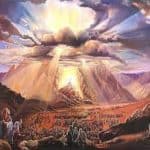Why we read Bamidbar before Shavuot.
The name for fourth of the five books of Moshe is called BaMidbar which translates as “in the Wilderness. The book called also the book of Numbers focuses on the journey of the people of Israel through wilderness . Such a journey is critical for faith and spiritual growth yet it is replete with obstacles and pitfalls, The narrative and the events described inevitably provide every individual the direction and process needed for the walk of faith through their own personal or collective wilderness.
Ezra the scribe decreed that in the weekly reading of the Torah portion the portion of Bamidbar (in the wilderness) would always precede the festival of Shavuot ( Pentecost) the festival commemorating the revelation of G-d at mount Sinai. Why was it thought to be important that we be reminded that the people of Israel were in the wilderness, before we re-experience the receiving of Torah on Shavuot?
The Chidushei Harim looks to the verse that discusses the counting and placement of the people in the portion of Bamidbar as critical for the receiving of Divine understanding. ”The children of Israel shall encamp, each man by his own camp and each man by his division.”(Numbers 1:52). He taught that each man and woman must find their place and their space in order to truly understand the imparting of Divine knowledge.
The Midrash (Numbers Rabbah 1:7) teaches that we need to be reminded that the choice of the wilderness as the place of G-d’s revelation was critical. The wilderness speaks loudly. The Hebrew word for wilderness or desert “Midbar“ is made up of the same letters as Midaber (speaking). From within the stillness and quietude of the wilderness much is heard.
There are several major components of the wilderness experience.
The first ,is that is an area that is owner-less.
The Mechilta D’Rashbi declares that the Torah was given to the people of Israel In the ownerless wilderness since had it been given in the Land of Israel, the residents of the Land of Israel would say, “It is ours”; and if it were given in some other place, the residents of that place would say, “It is ours.” Therefore it was given in the wilderness, because the revelation at mount Sinai was intended for the whole world. While it is true that for many, many generations it will be one people who will carry that revelation forward. Yet eventually it will be heard and understood by all of mankind “for the earth shall be full of the knowledge of Hashem, as the waters cover the sea”( Isaiah 11:9).
The second is that the experience of the wilderness is one of humility. Torah can only, and will only, be accessed by one who makes himself into a wilderness. One needs to be aware that one is living an existence that is dry and parched. Only then does one truly yearn to be quenched and taught.
Furthermore the experience of the wilderness or the desert is that of clear vision. It is in the wilderness that all is spread out in all its vastness and the heavens and the stars glisten unperturbed and uninterrupted.
In the wilderness one is overwhelmed with a sense of aloneness and tiny finiteness that somehow paradoxically connects one to He that is infinite. The sheer vastness of the desert humbles and breaks down the soul in such a way that one painfully yearns for the connection that lies “just beyond”.
It is in the midst of the wilderness experience wherein suddenly every plant, every sand dune, every living creature is noticed and becomes relevant and critical.
Finally, the wilderness is a place of great trial and struggle while at the same time being a place of great inner revelation. In the book of Hoshea we see Hashem using the wilderness as a place of chastisement and punishment. “…..and make her as a wilderness, and set her like a dry land, and slay her with thirst”( Hoshea 2:5). Yet after that experience of testing we read the following in the same chapter; “Therefore, behold, I will allure her, and bring her into the wilderness, and speak tenderly unto her.“(ibid:16). It is in the wilderness that Hashem’s tender words will be heard.
It is that experience that Hashem remembers fondly “Go, and cry in the ears of Jerusalem, saying: Thus said Hashem: I remember for thee the affection of your youth, the love of your espousals; how you went after Me in the wilderness, in a land that was not sown.” ( Jeremiah 2:1-2)
In preparation for again receiving the Torah on the festival of Shavuot, one needs to learn humility and yet feel a sense of belonging . One needs to combine discernment and awe. One also needs to develop clear vision and yet be ready to be overwhelmed by the vastness.
All these are the tools and attributes learned from the wilderness in preparation for the betrothal ceremony that is the festival of Shavuot.
